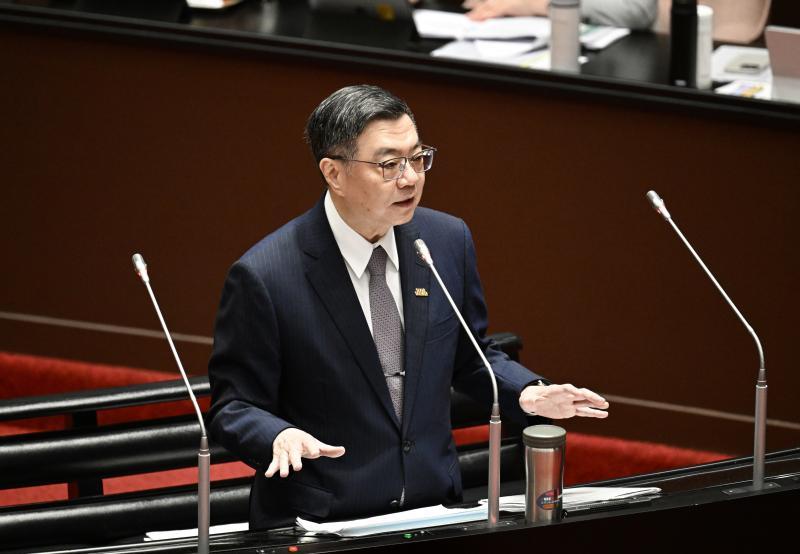Stable electricity prices are important to Taiwan’s industrial base, Premier Cho Jung-tai (卓榮泰) said today, defending the special budget’s NT$100 billion (US$3.11 billion) subsidy for Taiwan Power Co (Taipower).
On Thursday last week, the Executive Yuan passed a NT$410 billion special budget seeking to comprehensively respond to US tariffs and increase the country’s economic, social and security resilience.
Yesterday, Cho met with the legislative caucuses of all three major political parties to rally support for the NT$410 billion special budget, but faced pushback from the Chinese Nationalist Party (KMT) and Taiwan People’s Party (TPP) regarding the Taipower subsidy.

Photo: Lo Pei-te, Taipei Times
Prior to a Legislative Yuan meeting today, Cho thanked lawmakers for their time at the previous day’s meeting and answered questions about the special budget.
Cho and President William Lai (賴清德) have heard from industry leaders that stable electricity prices are a major concern, the premier said, adding that companies are seeking to avoid the “double shock” of tariffs and rising electricity rates.
The NT$100 billion subsidy would help Taipower deal with mounting losses — which reached NT$420 billion as of the end of last year — to enable the utility to consider social welfare and stability as part of its rate discussions, Cho said.
Hopefully, the opposition parties can understand industry’s concerns, he added.
The special budget is divided into three parts: national security, social welfare measures, and economic support for industry and employment.
The budget allocates funds to help vulnerable groups who would be negatively affected by the ongoing global economic situation, subsidies for low-income households and to repair aging homes, he said.
Cho said he hopes opposition parties can see that the special budget responds to the needs of industry, offers benefits for disadvantaged groups and would improve the country’s competitiveness.

Nipah virus infection is to be officially listed as a category 5 notifiable infectious disease in Taiwan in March, while clinical treatment guidelines are being formulated, the Centers for Disease Control (CDC) said yesterday. With Nipah infections being reported in other countries and considering its relatively high fatality rate, the centers on Jan. 16 announced that it would be listed as a notifiable infectious disease to bolster the nation’s systematic early warning system and increase public awareness, the CDC said. Bangladesh reported four fatal cases last year in separate districts, with three linked to raw date palm sap consumption, CDC Epidemic Intelligence

Two Taiwanese prosecutors were questioned by Chinese security personnel at their hotel during a trip to China’s Henan Province this month, the Mainland Affairs Council (MAC) said yesterday. The officers had personal information on the prosecutors, including “when they were assigned to their posts, their work locations and job titles,” MAC Deputy Minister and spokesman Liang Wen-chieh (梁文傑) said. On top of asking about their agencies and positions, the officers also questioned the prosecutors about the Cross-Strait Joint Crime-Fighting and Judicial Mutual Assistance Agreement, a pact that serves as the framework for Taiwan-China cooperation on combating crime and providing judicial assistance, Liang

The manufacture of the remaining 28 M1A2T Abrams tanks Taiwan purchased from the US has recently been completed, and they are expected to be delivered within the next one to two months, a source said yesterday. The Ministry of National Defense is arranging cargo ships to transport the tanks to Taiwan as soon as possible, said the source, who is familiar with the matter. The estimated arrival time ranges from late this month to early next month, the source said. The 28 Abrams tanks make up the third and final batch of a total of 108 tanks, valued at about NT$40.5 billion

Reports of Taiwanese going missing, being detained or interrogated, or having their personal liberties restricted in China increased about fourfold annually last year, the Mainland Affairs Council (MAC) said yesterday. Last year, 221 Taiwanese who traveled to China were reported missing, were detained and interrogated, or otherwise had their personal freedom restricted, up from 55 the previous year, the council said. Reopening group tours to China would be risky, as it would leave travelers with no way to seek help through official channels after Beijing shut down dialogue between the associations tasked with handling cross-strait tourism, the MAC said. Taipei’s Taiwan Strait Tourism